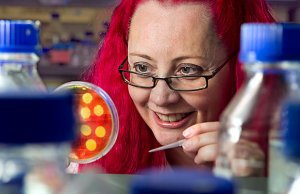About a third of the speakers at the TEDx conference in Christchurch next week will be scientists talking about their work. Will Harvie at The Press explores what science communication is, and why experts in science, technology, engineering and maths should do it.

An excerpt (read in full here):
“Life as we know it could end in 10 years if we don’t start taking drastic action,” Dr Siouxsie Wiles wrote in her blog in May.
Relying on a new World Health Organisation report, she told readers that “microbes responsible for gonorrhoea, urinary tract infections, pneumonia, bloodstream infections, infections in newborns and intensive- care unit patients are now resistant to the most effective antibiotics used to kill them.” The superbugs are coming.
It’s the sort of message that has made Wiles – aided perhaps by her memorable pink hair – one of the rising stars of New Zealand science communication. From her Bioluminescent Superbugs Lab at the University of Auckland, Wiles sends science missives and videos to the world about her specialist work (microbes that glow in the dark), her wider field (microbiology), and wider still (science generally).
These mostly unpaid efforts won her the 2013 Prime Minister’s Science Media Communication Prize – a $100,000 gift to be split 50-50 between her work and her personal use – regular commentary slots on Radio New Zealand and in other media and high billing at the TEDxChristchurch speaking conference next Saturday.
And what is this thing called science communication that’s worth $100,000 to a lucky scientist? “It’s breaking down the barriers between scientists, the funders of research and the general public,” Wiles says.
It’s Dr Mark Quigley explaining earthquakes and liquefaction to desperate Cantabrians after the quakes. It’s Professor Doug Sellman campaigning against alcohol and illicit drugs. Overseas, it’s Carl Sagan’s 1980 documentary series Cosmos, the BBC television programmes presented by medical doctor and researcher Robert, Lord Winston, and even the work of controversialist Richard Dawkins.
It’s taking to blogs, Twitter, Facebook, television, radio, newspapers and news websites, schools and stages to explain science and the scientific method, the limits of what is known and what might never be known.